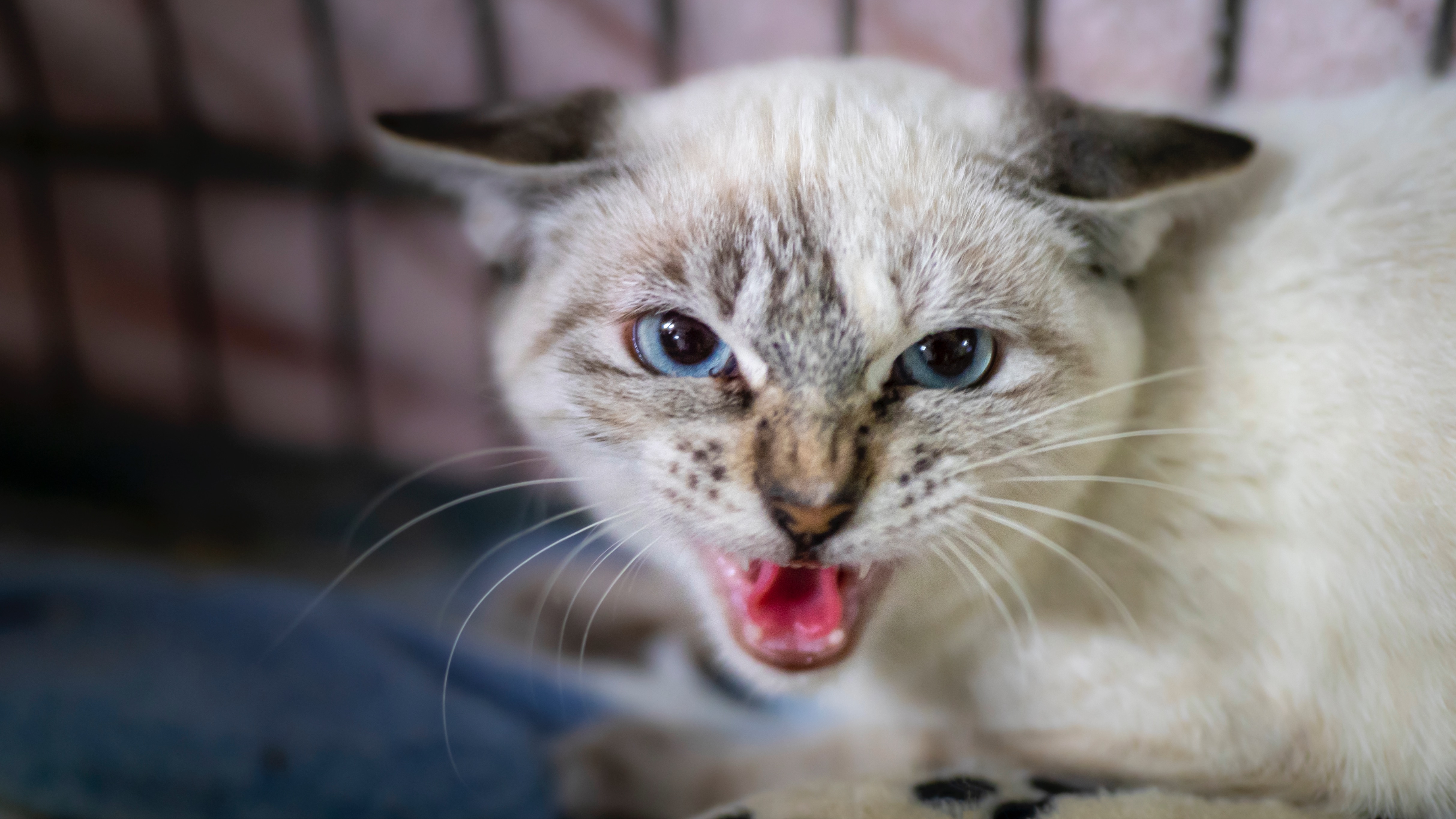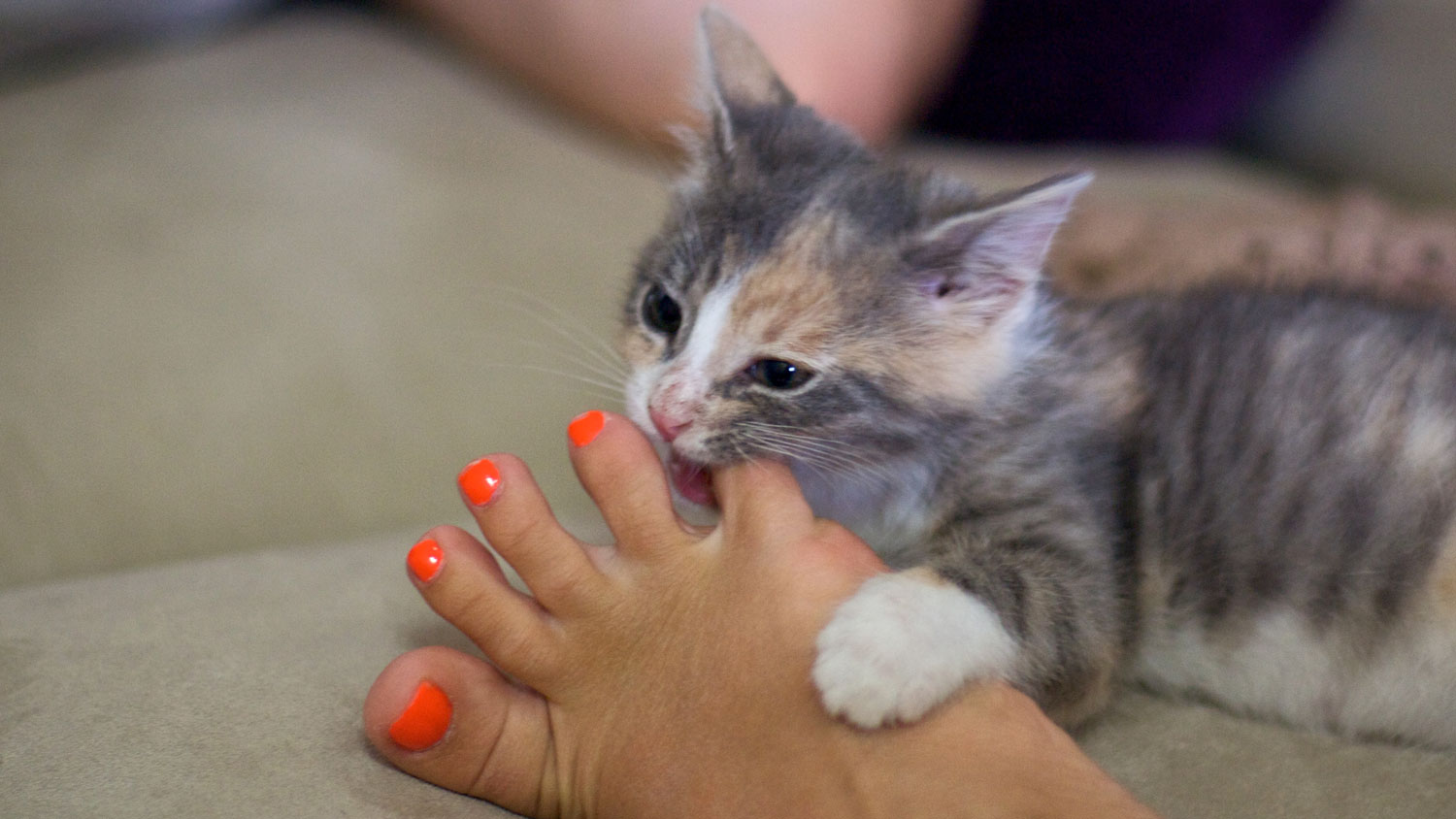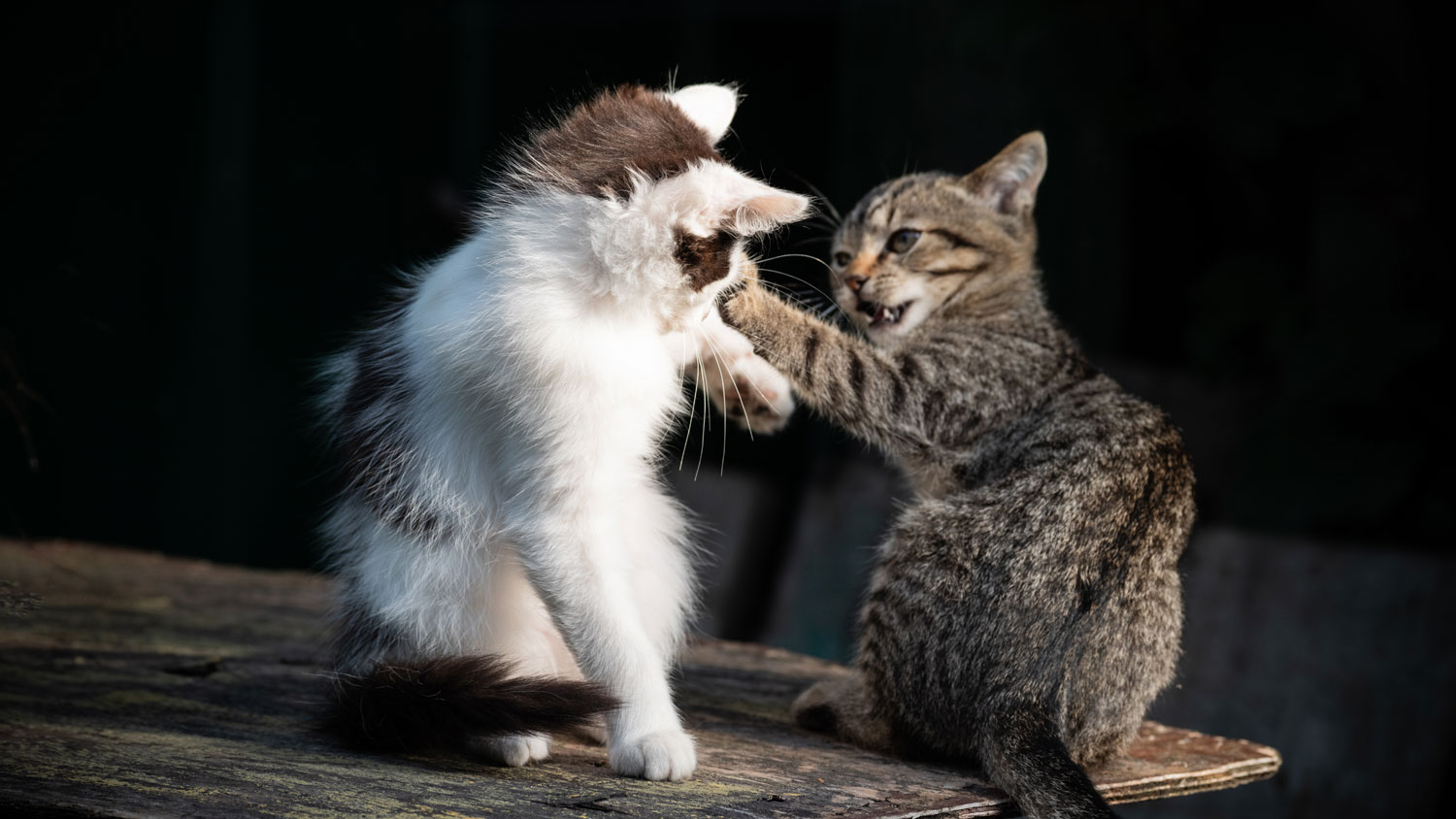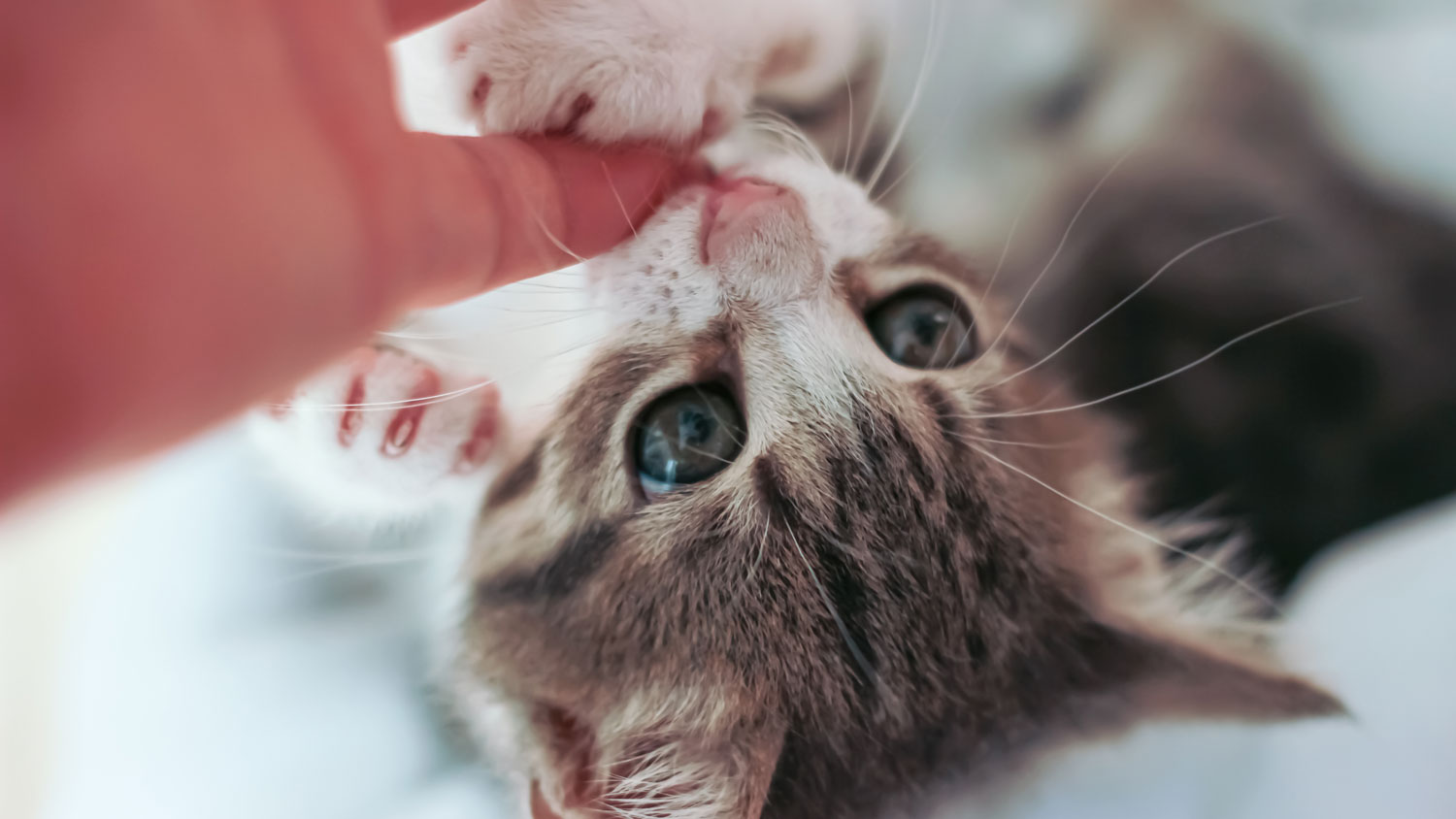Vet shares four tips for dealing with aggressive kittens — and the last one really got us thinking!
Dealing with aggressive kittens can be challenging, but this vet’s advice will help take the feistiness out of your feline

Get the best advice, tips and top tech for your beloved Pets
You are now subscribed
Your newsletter sign-up was successful
Trying to manage aggressive kittens is not at all what comes to mind when you think about welcoming a new little bundle of fluff into your family, and yet, that’s sometimes exactly what cat owners find themselves having to deal with.
While you may have spent ages researching the best kitten food and investing in quality toys, you probably didn’t give a great deal of thought to the possibility that you may end up with a kitten who hisses at you, bites, scratches and marks all the furniture.
There are so many things to consider when you get a kitten and understanding what aggression is, how it manifests and what you can do to prevent it, can be really helpful. There are all sorts of situations that may cause a kitten to behave aggressively, and being aware of these can help you manage any issues that may arise.
To get to the bottom of this complex issue, we invested the help of expert vet, Dr. Rebecca MacMillan, who shared her thoughts with us on why your kitten may be behaving aggressively, how to know if they’re being aggressive or simply engaging in rough play, and what you can do to put a stop to aggressive behavior before it gets out of hand.

Dr. Rebecca MacMillan is a companion animal vet with over 13 years of experience treating and looking after pets. She graduated from the UK Royal Veterinary college in 2009, and has worked in several practices over the years. Rebecca is also an experienced writer, using her veterinary background to offer expert opinion and advice.
Signs of an aggressive kitten

So, how can you tell the difference between over-exuberant kitten behavior and actual aggression? There are a few signs to look out for:
1. Biting and scratching
Is your kitten biting you or scratching you a little too much? Obviously not all biting and scratching from a kitten is necessarily aggressive; it could simply be that they're getting over-stimulated during playtime. However if your kitten starts attacking you at random moments there could be a bit more to it than that.
Get the best advice, tips and top tech for your beloved Pets
2. Hissing
Kittens know that hissing is a threat; it's one of the earliest lessons they learn from their moms, who will hiss at very young kittens as a form of warning. If your kitten hisses at you it's a sign that it's feeling threatened or scared.
3. Marking
Another thing a kitten might do if it's feeling scared or threatened or even bored is mark its territory, something that you definitely don't want around the house.
4. Aggressive body language
Every cat owner needs to know the physical cues that a cat might express when it's feeling aggressive, frightened or threatened. Crouching, flat ears turned backwards, dilated pupils, arched backs and bottle-brush tails are all signs that something isn't right, and that you should approach with caution.
Why is my kitten being aggressive?

There's no simple explanation as to why your kitten might be acting aggressively; there are instead a number of possible reasons, and depending on your kitten's situation it could be any – and potentially a combination – of them.
By keeping an eye on your kitten's behavior you should be able to deduce which of these reasons lie behind any aggressive outbursts.
1. Hunting and stalking instincts
In most kittens the most likely reason for aggressive behavior is its own instinct to hunt and stalk. Most kitten play is about polishing its hunting prowess, and sometimes this spills out beyond play-fighting with sibling and pouncing on toys, and your kitten sees your hands or feet as prey to be attacked. Thankfully this is easy to rectify; we'll come back to it later.
2. Lack of socialization
A kitten that's been weaned too early or hand-reared may not have had time to pick up all the important social cues that most cats take for granted, and this may result in aggression towards people and also to other cats, simply because it hasn't learned the rules.
3. Fear or curiosity
Fear and curiosity are two sides of the same coin; if your kitten's confronted by something unfamiliar it can react to it in either way, but in both instances the end result can be an aggressive lashing-out.
4. They're being territorial
If you've introduced a new kitten to a home shared with other pets, you'll have likely started it off by confining it to a single room before gradually introducing it to the rest of the household, as suggested in our guide to adopting a kitten.
However, this could well result in your kitten seeing that particular room as its own territory, and it may not take kindly to its new housemates encroaching on its own domain. Similarly your kitten may well view its litter tray as its own personal space, and it'll be similarly cross if other pets get too close to it.
5. Boredom or overstimulation
Is your cat bored? An under- or over-stimulated kitten can be a dangerous little thing. If it's bored because it's not being played with enough, or if there aren't enough toys to play with or exciting places to explore, it may express its frustration through aggression.
And at the other end of the scale, an over-excited cat – whether it's gotten carried away during playtime, or had enough of being cuddled and petted – can just as easily go on the attack.
6. Medical reasons
Finally, there could be a medical explanation for your kitten's behavior, which might well necessitate a trip to the vet. Kitten teething could easily result in a grumpy little feline, but that at least is something you can remedy with the best kitten teething toys, but other, more serious dental problems could make it act aggressively as well.
However if your kitten has an underlying medical condition, is in pain or if they have problems with their central nervous system, this could also result in aggressive behavior. If your kitten's showing other signs of possible ill health such as a change in appetite, weight loss, increased urination or vomiting, you should definitely get it to a vet to be checked out.
7. They don't like being touched
"Kittens can be aggressive for several reasons; one of these is being ‘touched out’ from too much petting," explains MacMillan. "Some kittens reach their limit quicker than others, so reduce the risk of them lashing out, try not to overwhelm your kitten with prolonged cuddles and forced interactions — short but frequent fusses are better."
How to stop aggression in kittens

If you've decided that your kitten's behaving more aggressively than usual, there's no need to panic; there are a number of ways you can address the problem and encourage better behavior in future.
1. Don't let them play with your hands or feet
Fingers and toes can be preternaturally inviting to a curious kitten, but letting it play with them is likely to result in pain for you.
Focus your kitten's attention on toys instead, and should it attack your hands or feet you should keep very still and quiet until they lose interest, then distract them with one of the best kitten toys. Find more tips for safe and rewarding playtimes in our guide to how to play with a kitten.
2. Don't punish your kitten
If you've spent any time with cats you'll have probably learned that punishment has no effect on them whatsoever, and can often make matters worse. Cats simply don't associate punishment with whatever it is they've just done, so if you yell at your kitten for biting and scratching you it might well be scared, but it won't take that reaction as a lesson not to do it again.
Instead you should focus on positive reinforcement; if your kitten acts aggressively, refocus it on fun toys, then when it turns its attention to playing with them, reward it with effusive praise and one of the best kitten treats.
3. Time-outs can help
While punishment doesn't work on kittens, a bit of enforced quiet time can make a difference. If your kitten's acting up incessantly, try confining it to its own room for a short time (10 minutes or so should suffice), or simply ignore it completely. It may not sit down and think about what it's done, but it should at least give it time to calm down a little.
4. Don't adopt a kitten as your only pet
Consider getting a pair of kittens, as opposed to just one cat. While cats are naturally solitary animals and do ok living by themselves, sometimes having a sibling with whom they can learn healthy play habits, can be really helpful. Although, one word of caution — we wouldn't recommend adding a kitten into a home with an already aggressive cat, as this may make things worse. However, adopting two kittens at the same time is worth considering.
Is my cat playing or being aggressive with me?

There's a fine line between rough play and aggression, so it can sometimes be hard to tell whether a kitten's got carried away in the excitement of playtime or if it's acting up.
By understanding the signs above you should be able to tell the difference; in particular you should pay close attention to its body language, and also note whether it's attacking you during play, or launching itself at your feet when you're just walking past. The latter is a lot more likely to be an aggressive act.
Does kitten aggression go away?
In all likelihood, yes. If your kitten's had a normal upbringing, any acts of aggression are likely to be more to do with playtime getting a bit out of hand, which in turn teaches it useful boundaries that should result in less overtly aggressive behavior; by 16 weeks old most kittens have figured out acceptable limits of behavior.
However if your kitten's behavior problems are more to do with inadequate socialization, you may well have to spend more time working with it in order to iron out its aggressive kinks; we can help with our guide to how to socialize a kitten.
Jim is a writer, performer and cat-wrangler based in Bath, who last year adopted a pair of sibling rescue cats who turned out to be effectively feral, and has spent a lot of time since then trying to get them accustomed to people (some success) and each other (ongoing project).

